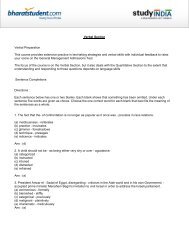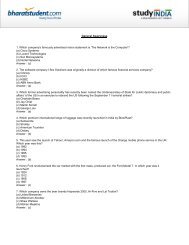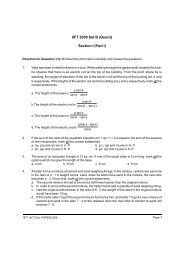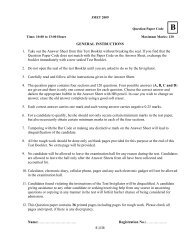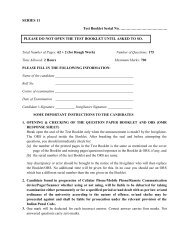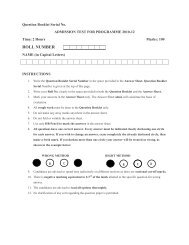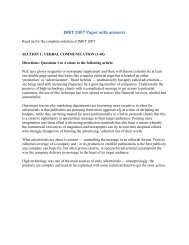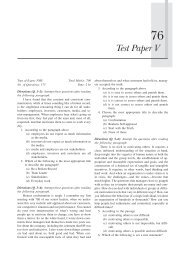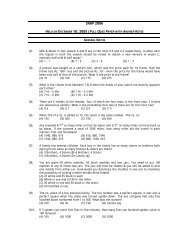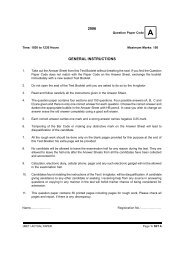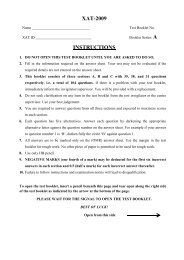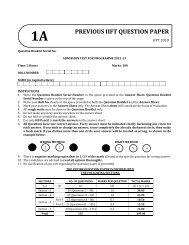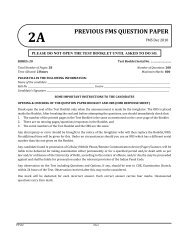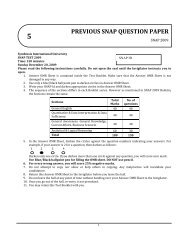ADMISSION TEST FOR PROGRAMME 2008-10
ADMISSION TEST FOR PROGRAMME 2008-10
ADMISSION TEST FOR PROGRAMME 2008-10
You also want an ePaper? Increase the reach of your titles
YUMPU automatically turns print PDFs into web optimized ePapers that Google loves.
Direction for Questions 88-99:<br />
SECTION – C (PART – i)<br />
Read the three passages carefully and answer the questions given at the end of each<br />
passage:<br />
Passage - 1<br />
The trouble started on May 4, 2004, only days after Google's celebrated comingout<br />
party. Geico, the giant automobile insurer, filed a lawsuit against the search engine<br />
for trademark infringement. The insurer claimed that Google's advertising system<br />
unlawfully profited from trademarks that Geico owned. Since all of Google's revenue<br />
and growth was from advertising, the disclosure of the lawsuit appeared ominous. “We<br />
are, and may be in the future, subject to intellectual property rights claims, which are<br />
costly to defend, could require us to pay damages, and could limit our ability to use<br />
certain technologies,” Google disclosed in a public filing outlining potential risks.<br />
Abroad, where Google had promising growth prospects, similar court challenges also<br />
arose. “A court in France held us liable for allowing advertisers to select certain<br />
trademarked terms as keywords,” the company declared. “We have appealed this<br />
decision. We were also subject to two lawsuits in Germany on similar matters.”<br />
To make matters worse, it turned out that prior to its IPO filing, Google had eased<br />
its trademark policy in the U.S., allowing companies to place ads even if they were<br />
pegged to terms trademarked and owned by others. That was a significant shift, and one,<br />
Google warned could increase the risk of lawsuits against the company. It was also a<br />
practice that Yahoo, its search engine rival, did not permit. Google claimed it made the<br />
policy change to serve users, but some financial analysts said it appeared designed to<br />
pump profits before the IPO.<br />
And there was more. Competition from Yahoo and Microsoft posed a greater<br />
challenge to Google following the disclosure about its mammoth profitability. With so<br />
much money at stake, the intensity of the competition would heat up. Such competition<br />
might be good for computer users searching the Internet, but Google said it posed<br />
additional risk for potential shareholders. “If Microsoft or Yahoo are successful in<br />
providing similar or better Web search results compared to ours or leverage their<br />
platforms to make their Web search services easier to access than ours, we could<br />
experience a significant decline in user traffic,” the company disclosed. In addition,<br />
Google warned that its momentum seemed unsustainable due to competition and “the<br />
inevitable decline in growth rates as our revenues increase to a higher level.”<br />
Then there was the question of Google's exclusive reliance on advertising, and<br />
one particular type of advertising, for all of its revenue. That was potentially quite<br />
problematic. If Yahoo or Microsoft gained ground on search, users could flock to their<br />
30



